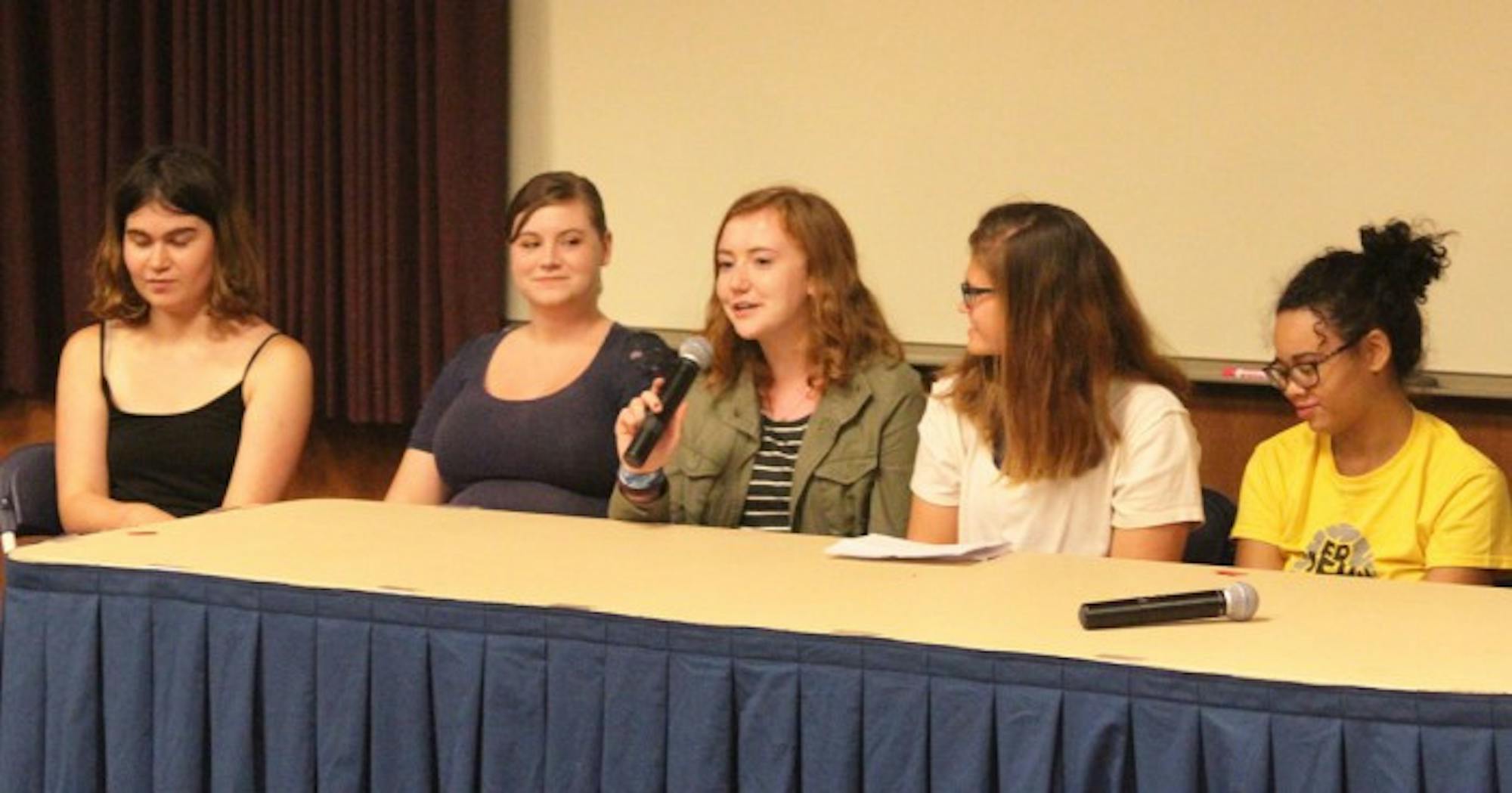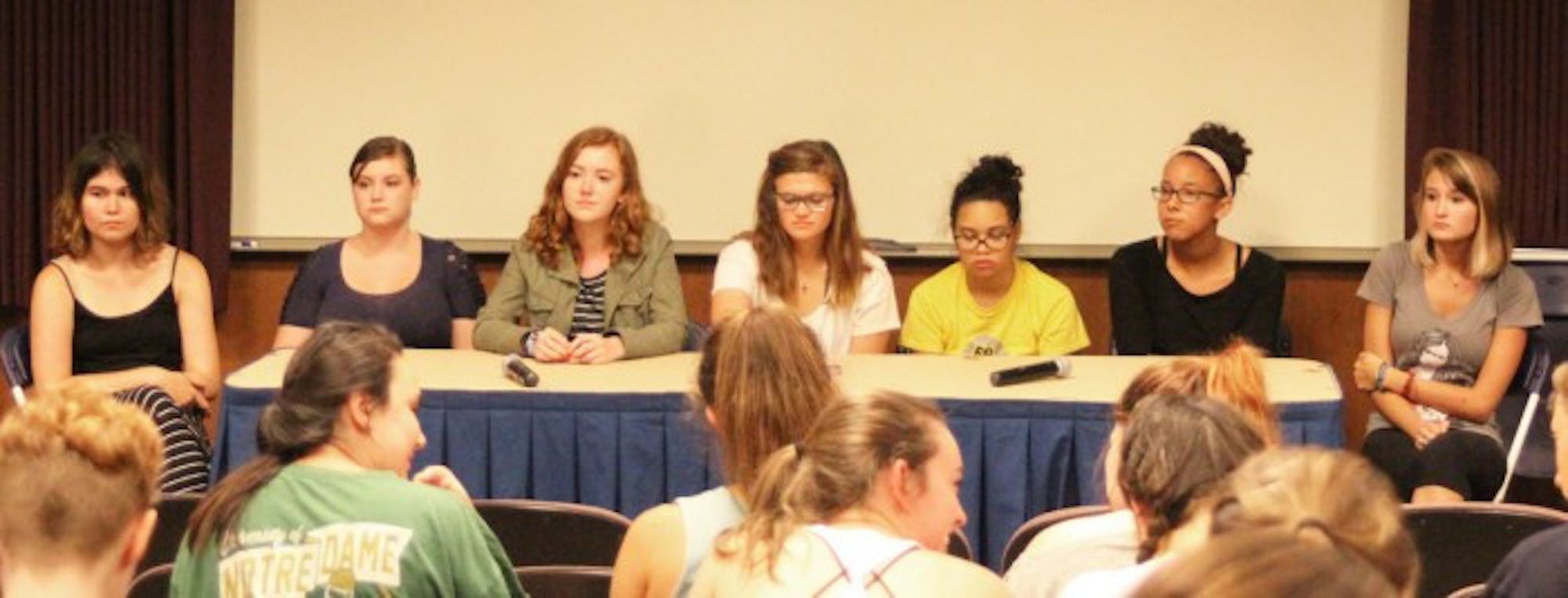A panel of Saint Mary’s students shared their experiences with mental illness Monday as part of the College’s Support a Belle, Love a Belle (SABLAB) week.
Sophomore Alicia Twisselmann started off the panel talking about about her struggle with anxiety and depression. She said the combination of her anxiety and depression with attention deficit disorder (ADD) makes it difficult for her to stay motivated.
“I have such high goals and aspirations, and I’m a perfectionist,” she said.“Yet at the same time, I still can’t quite bring myself to do what I know I need to.”
She said she has been affected by her mental illnesses for as long as she can remember, and was first put on medication in second grade.
“I’m thankful that at this point it’s just sort of at the background, but it still definitely continues to have an impact,” she said.
Twisselmann said small acts of kindness matter the most to her and will help encourage her to open up to others about how she’s feeling. 
Sophomore Meredith Mackowicz spoke about her experience living with generalized anxiety disorder and clinical depression. She said while she was able to self-diagnose her mental disorders, she finally opened up to a doctor two summers ago.
“I feel like there’s such a stigma, especially on college campuses, about mental illnesses. And while it is a part of me, it’s not the biggest part of me and it’s not the most important part of me,” Mackowicz said. “There’s so many other things that I take pride in like music and theatre and art and there’s so many aspects to a person.”
Mackowicz said once she was able to open up about her mental illness, she found other students on campus who had the same issues and background as her.
“I think the best way to beat the stigma is to just not worry about it and to realize some people are going to have issues that you won’t understand and that they can’t explain to you,” she said. “I think we just have to be patient, we have to be open to people and realize that if you just do one small thing you can make a complete difference in someone else’s life.”
Sophomore Ashley Coates opened up about her struggle with anxiety and clinical depression. She said she knew there was a problem when she would wake up anxious and unable to get out of bed.
“Although it is 100 percent mental — as in it’s [your head] that’s making you feel that way — it does affect your body physically,” Coates said. “For example, if I become anxious, I can’t eat.”
Coates said while there are difficult patches, she was able to get a better grasp on her mental illnesses with the help of the Saint Mary’s psychiatrist.
“There’s an end,” she said. “There’s a point where it stops where you’re okay again, and you’ll be okay. I just want everyone to know that there is that point — whether you’re dealing with anxiety or dealing with depression or whatever you’re dealing with — there is a point where you will be okay again and that’s where I’m trying to be.”
Junior Taylor Thomas shared her struggle with post-traumatic stress disorder (PTSD) and depression. Thomas said she is a perfectionist and had difficulty opening up about the side effects of her mental illnesses with others.
“I did really well in school freshman year and then things started going downhill, especially my sophomore year,” she said. “I didn’t care about tests, I didn’t care about anything, I didn’t even want to get out of bed most days. It was really rough.”
Thomas said Saint Mary’s staff and faculty have been supportive and helpful on her journey towards learning to cope with PTSD and depression.
“It has been rough, it has not been easy at all,” Thomas said. “So if you’re going into therapy thinking one session is it — no. It’s going to be a long haul, and I’m still dealing with it today.”
Junior Alyssa Richards spoke about her struggles with depression. She said her depression comes and goes, but is manageable now.
“It got to the point where I felt like a zombie just watching myself go through my day-to-day tasks,” she said. “I lost interest in things that were really important to me.”
Richards said she has been able to find peace and solace in nature.
“I am a very strong-minded person, even though I do have depression, so I was determined to find out the things that make me happy,” she said. “I’m doing a lot better, and I’ve figured out how to deal with it on my own.”
Mackowicz said seeking help is important even if someone is unsure if they have a diagnosable disorder.
“Disorders manifest themselves in many different ways and in many different forms, and I think it's important to know that because if you think you might have one aspect of a disorder that's okay," Mackowicz said. "It's still good to get help, it's still good to talk to somebody about that one aspect.”













